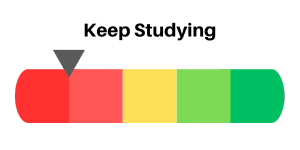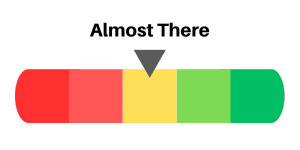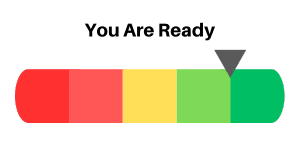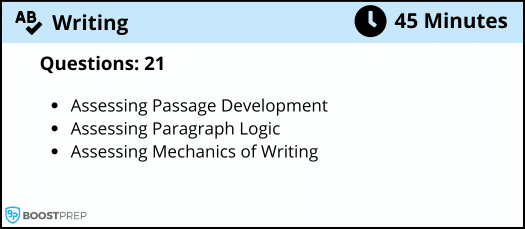Take our KNAT writing practice test to test your readiness. Our exam has 20 questions on the same concepts and topics as the actual exam.
Click on the “Start Exam” button below to begin!
Kaplan Nursing Writing Practice Test
Exam Summary
0 of 20 Questions completed
Questions:
Information
You have already completed the exam before. Hence you can not start it again.
Exam is loading…
You must sign in or sign up to start the exam.
You must first complete the following:
Results
Results
Time has elapsed
You have reached 0 of 0 point(s), (0)
Earned Point(s): 0 of 0, (0)
0 Essay(s) Pending (Possible Point(s): 0)
Categories
- KNAT Assessing Mechanics of Writing 0%
- KNAT Assessing Paragraph Logic 0%
- KNAT Assessing Passage Development 0%
-
Keep Studying: You probably will not pass the KNAT writing section. You need to continue studying. Take some of our full-length practice exams.
-
Almost There: We recommend that you keep studying for the KNAT writing section. You may be able to pass, but it will be close. Take some of our full-length practice exams.
-
You Are Ready: We feel you are ready for the KNAT writing section. Continue to study if you want to be cautious. Take some of our full-length practice exams.
- 1
- 2
- 3
- 4
- 5
- 6
- 7
- 8
- 9
- 10
- 11
- 12
- 13
- 14
- 15
- 16
- 17
- 18
- 19
- 20
- Current
- Review
- Answered
- Correct
- Incorrect
-
Question 1 of 20
1. Question
Journalism
Use the following passage to answer the question.
(1) Journalism plays a crucial role in informing the public and holding institutions accountable. (2) In recent years, however, the landscape of journalism has dramatically changed.
(3) The rise of digital platforms has brought both challenges and new opportunities for traditional news organizations. (4) As social media has become more obsolete, journalists face the difficult task of navigating an environment where misinformation spreads quickly. (5) These platforms have not only changed how news is consumed, but they have also impacted the public’s trust in journalism.
(6) The immediacy of digital news has pressured reporters to prioritize speed over accuracy. (7) While breaking news quickly is important, it often comes at the cost of careful fact-checking. (8) Nevertheless, the essential principles of journalism—truthfulness, accuracy, and objectivity—remain as vital as ever. (9) Journalists must continue to strive for these very high standards, despite the fast-paced, often chaotic nature of modern news.
(10) As technology evolves, so too will the tools journalists use to tell stories that matter. (11) The ability to adapt is key for journalists in this changing environment. (12) Ensuring the future of journalism, means balancing new technologies with ethical reporting practices.
Which word in paragraph 2 is incorrect?
CorrectIncorrect -
Question 2 of 20
2. Question
Journalism
Use the following passage to answer the question.
(1) Journalism plays a crucial role in informing the public and holding institutions accountable. (2) In recent years, however, the landscape of journalism has dramatically changed.
(3) The rise of digital platforms has brought both challenges and new opportunities for traditional news organizations. (4) As social media has become more obsolete, journalists face the difficult task of navigating an environment where misinformation spreads quickly. (5) These platforms have not only changed how news is consumed, but they have also impacted the public’s trust in journalism.
(6) The immediacy of digital news has pressured reporters to prioritize speed over accuracy. (7) While breaking news quickly is important, it often comes at the cost of careful fact-checking. (8) Nevertheless, the essential principles of journalism—truthfulness, accuracy, and objectivity—remain as vital as ever. (9) Journalists must continue to strive for these very high standards, despite the fast-paced, often chaotic nature of modern news.
(10) As technology evolves, so too will the tools journalists use to tell stories that matter. (11) The ability to adapt is key for journalists in this changing environment. (12) Ensuring the future of journalism, means balancing new technologies with ethical reporting practices.
Which sentence includes an unnecessary word?
CorrectIncorrect -
Question 3 of 20
3. Question
Journalism
Use the following passage to answer the question.
(1) Journalism plays a crucial role in informing the public and holding institutions accountable. (2) In recent years, however, the landscape of journalism has dramatically changed.
(3) The rise of digital platforms has brought both challenges and new opportunities for traditional news organizations. (4) As social media has become more obsolete, journalists face the difficult task of navigating an environment where misinformation spreads quickly. (5) These platforms have not only changed how news is consumed, but they have also impacted the public’s trust in journalism.
(6) The immediacy of digital news has pressured reporters to prioritize speed over accuracy. (7) While breaking news quickly is important, it often comes at the cost of careful fact-checking. (8) Nevertheless, the essential principles of journalism—truthfulness, accuracy, and objectivity—remain as vital as ever. (9) Journalists must continue to strive for these very high standards, despite the fast-paced, often chaotic nature of modern news.
(10) As technology evolves, so too will the tools journalists use to tell stories that matter. (11) The ability to adapt is key for journalists in this changing environment. (12) Ensuring the future of journalism, means balancing new technologies with ethical reporting practices.
Which sentence should be deleted because it provides unnecessary information?
CorrectIncorrect -
Question 4 of 20
4. Question
Journalism
Use the following passage to answer the question.
(1) Journalism plays a crucial role in informing the public and holding institutions accountable. (2) In recent years, however, the landscape of journalism has dramatically changed.
(3) The rise of digital platforms has brought both challenges and new opportunities for traditional news organizations. (4) As social media has become more obsolete, journalists face the difficult task of navigating an environment where misinformation spreads quickly. (5) These platforms have not only changed how news is consumed, but they have also impacted the public’s trust in journalism.
(6) The immediacy of digital news has pressured reporters to prioritize speed over accuracy. (7) While breaking news quickly is important, it often comes at the cost of careful fact-checking. (8) Nevertheless, the essential principles of journalism—truthfulness, accuracy, and objectivity—remain as vital as ever. (9) Journalists must continue to strive for these very high standards, despite the fast-paced, often chaotic nature of modern news.
(10) As technology evolves, so too will the tools journalists use to tell stories that matter. (11) The ability to adapt is key for journalists in this changing environment. (12) Ensuring the future of journalism, means balancing new technologies with ethical reporting practices.
Which sentence contains an error in punctuation?
CorrectIncorrect -
Question 5 of 20
5. Question
Journalism
Use the following passage to answer the question.
(1) Journalism plays a crucial role in informing the public and holding institutions accountable. (2) In recent years, however, the landscape of journalism has dramatically changed.
(3) The rise of digital platforms has brought both challenges and new opportunities for traditional news organizations. (4) As social media has become more obsolete, journalists face the difficult task of navigating an environment where misinformation spreads quickly. (5) These platforms have not only changed how news is consumed, but they have also impacted the public’s trust in journalism.
(6) The immediacy of digital news has pressured reporters to prioritize speed over accuracy. (7) While breaking news quickly is important, it often comes at the cost of careful fact-checking. (8) Nevertheless, the essential principles of journalism—truthfulness, accuracy, and objectivity—remain as vital as ever. (9) Journalists must continue to strive for these very high standards, despite the fast-paced, often chaotic nature of modern news.
(10) As technology evolves, so too will the tools journalists use to tell stories that matter. (11) The ability to adapt is key for journalists in this changing environment. (12) Ensuring the future of journalism, means balancing new technologies with ethical reporting practices.
Which sentence most clearly introduces the main challenge journalists face in the digital age?
CorrectIncorrect -
Question 6 of 20
6. Question
The following sentence contains which type of phrase?
Don’t worry. There’s always a better tomorrow.
CorrectIncorrect -
Question 7 of 20
7. Question
Select the best word for the blank in the following sentence.
Mike’s favorite _______ is a hot fudge sundae with whipped cream.
CorrectIncorrect -
Question 8 of 20
8. Question
Select the best word for the blank in the following sentence.
Sky diving didn’t scare him. He was used to living ________.
CorrectIncorrect -
Question 9 of 20
9. Question
Select the best word(s) for the blank in the following sentence.
Tim wanted to give _____ a letter, but she didn’t show up to school.
CorrectIncorrect -
Question 10 of 20
10. Question
Which of the following is grammatically incorrect?
CorrectIncorrect -
Question 11 of 20
11. Question
Which word from the following sentence is a linking verb?
Allie looked exhausted because she studied all night.
CorrectIncorrect -
Question 12 of 20
12. Question
Studying Techniques
Use the following passage to answer the question.
(1) Effective studying techniques can drastically improve students’ academic performance. (2) Many students rely on passive methods, such as rereading textbooks which is not the most efficient approach. (3) Active learning strategies, including practice testing and self-explanation, have been shown to enhance retention. (4) Flashcards, for example, offer a practical way to engage in spaced repetition, a method proven to boost memory. (5) Organizing study materials and setting specific goals are other techniques that contribute to better outcomes.
(6) Another important factor is ensuring a quiet and comfortable study environment. (7) Studies show that students who study in short, frequent sessions tend to retain more information than those who study for longer periods without breaks. (8) It is also beneficial to review notes shortly after learning new material. (9) While some prefer group study sessions, others may find them distracting and opt for individual study instead. (10) Albert Einstein recommended using a combination of short and long study sessions. (11) Ultimately, finding the right mix of techniques that works for each individual is key to successful studying.
Which sentence would BEST serve as a conclusion to the passage?
CorrectIncorrect -
Question 13 of 20
13. Question
Studying Techniques
Use the following passage to answer the question.
(1) Effective studying techniques can drastically improve students’ academic performance. (2) Many students rely on passive methods, such as rereading textbooks which is not the most efficient approach. (3) Active learning strategies, including practice testing and self-explanation, have been shown to enhance retention. (4) Flashcards, for example, offer a practical way to engage in spaced repetition, a method proven to boost memory. (5) Organizing study materials and setting specific goals are other techniques that contribute to better outcomes.
(6) Another important factor is ensuring a quiet and comfortable study environment. (7) Studies show that students who study in short, frequent sessions tend to retain more information than those who study for longer periods without breaks. (8) It is also beneficial to review notes shortly after learning new material. (9) While some prefer group study sessions, others may find them distracting and opt for individual study instead. (10) Albert Einstein recommended using a combination of short and long study sessions. (11) Ultimately, finding the right mix of techniques that works for each individual is key to successful studying.
Which sentence disrupts the logical flow of the second paragraph?
CorrectIncorrect -
Question 14 of 20
14. Question
Studying Techniques
Use the following passage to answer the question.
(1) Effective studying techniques can drastically improve students’ academic performance. (2) Many students rely on passive methods, such as rereading textbooks which is not the most efficient approach. (3) Active learning strategies, including practice testing and self-explanation, have been shown to enhance retention. (4) Flashcards, for example, offer a practical way to engage in spaced repetition, a method proven to boost memory. (5) Organizing study materials and setting specific goals are other techniques that contribute to better outcomes.
(6) Another important factor is ensuring a quiet and comfortable study environment. (7) Studies show that students who study in short, frequent sessions tend to retain more information than those who study for longer periods without breaks. (8) It is also beneficial to review notes shortly after learning new material. (9) While some prefer group study sessions, others may find them distracting and opt for individual study instead. (10) Albert Einstein recommended using a combination of short and long study sessions. (11) Ultimately, finding the right mix of techniques that works for each individual is key to successful studying.
What change should be made to correct a grammatical error in sentence 2?
CorrectIncorrect -
Question 15 of 20
15. Question
Studying Techniques
Use the following passage to answer the question.
(1) Effective studying techniques can drastically improve students’ academic performance. (2) Many students rely on passive methods, such as rereading textbooks which is not the most efficient approach. (3) Active learning strategies, including practice testing and self-explanation, have been shown to enhance retention. (4) Flashcards, for example, offer a practical way to engage in spaced repetition, a method proven to boost memory. (5) Organizing study materials and setting specific goals are other techniques that contribute to better outcomes.
(6) Another important factor is ensuring a quiet and comfortable study environment. (7) Studies show that students who study in short, frequent sessions tend to retain more information than those who study for longer periods without breaks. (8) It is also beneficial to review notes shortly after learning new material. (9) While some prefer group study sessions, others may find them distracting and opt for individual study instead. (10) Albert Einstein recommended using a combination of short and long study sessions. (11) Ultimately, finding the right mix of techniques that works for each individual is key to successful studying.
Which sentence provides unnecessary information and could be removed without changing the overall meaning of the passage?
CorrectIncorrect -
Question 16 of 20
16. Question
Which of the following sentences is grammatically correct?
CorrectIncorrect -
Question 17 of 20
17. Question
The following sentence contains which type of phrase?
Mr. Carlton suffered complications from the car accident and he’s at rest now.
CorrectIncorrect -
Question 18 of 20
18. Question
Select the best word for the blank in the following sentence.
California really felt the ________ of the global drought.
CorrectIncorrect -
Question 19 of 20
19. Question
Which of the following sentences is grammatically correct?
CorrectIncorrect -
Question 20 of 20
20. Question
Which of the following sentences is grammatically correct?
CorrectIncorrect
See If You’re Ready
Curious if you’re ready for the actual exam? Take our diagnostic exam that covers all 4 sections to find out.
KNAT Writing Overview
The Kaplan Nursing Admissions Test (KNAT) is made up of 4 sections. Writing is 1 of those 4 sections. You will find the following on the writing section:
- Number of Questions: 21
- Time Limit: 45 Minutes
The 3 major concepts tested on the writing section will be:
- Assessing Passage Development
- Assessing Paragraph Logic
- Assessing Mechanics of Writing
If you want to practice for other sections of the exam, visit our KNAT practice test home.
Studying for KNAT Writing
Studying for a writing exam can be challenging. How exactly do you study? We cover all of the concepts and topics you need to know in our Kaplan Nursing Admissions Test prep course. You will find the following in the writing portion of our course:
- Types of Passages
- Identifying the Central Idea and Supporting Evidence
- Transition Words and Phrases to Connect Ideas
- Basic Text Structures
- Coherence and Unity in Paragraphs
- Parts of Speech
- Punctuation
- Capitalization
- Sentence Structure
- Modifiers
- Consistency in Verb Tense and Subject-Verb Agreement
- Proper Use of Pronouns and Antecedents
- Common Grammar Mistakes
In addition, you will also find 5 full-length exams and a question bank specific to writing.
KNAT Writing FAQs
There will be 21 questions on this section of the exam.
You will have a total of 45 minutes to finish this section.
We recommend that you first learn all of the key concepts. An easy way to do this is by reviewing the learning modules in our course.
After you have learned the key concepts, you need to practice as much as possible. Answering practice questions and taking practice exams will help you become more familiar with the exam. This familiarity will help when test-day comes around.



